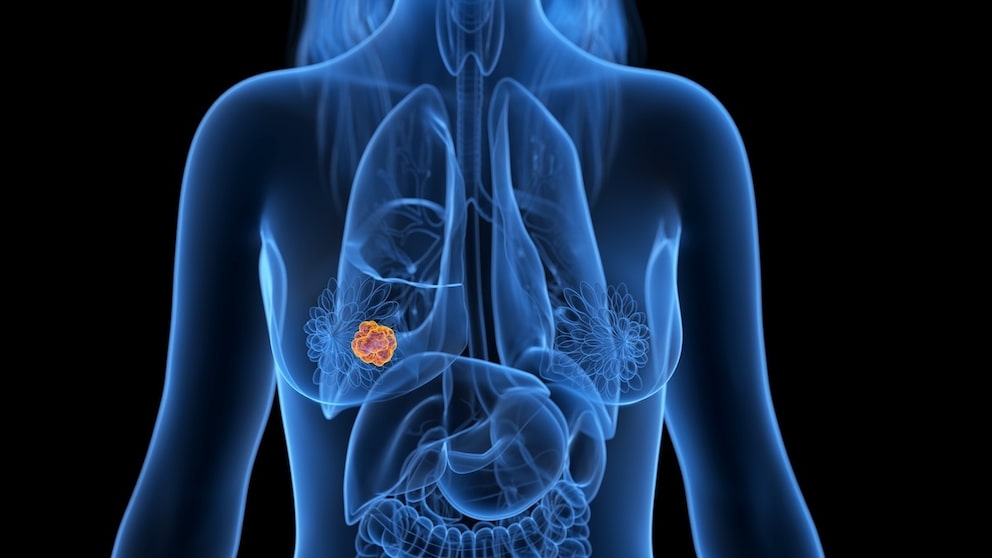December 12, 2024, 1:59 pm | Read time: 4 minutes
The exact causes of breast cancer are still not fully understood. However, research has now developed a better understanding of which factors can increase the risk of the disease. In this context, both hormones and body weight appear to play an important role – even together. A recent study has now provided new insights into the effects of weight gain at different stages of life on the risk of breast cancer.
Various lifestyle factors are thought to increase the risk of breast cancer. These include a diet high in sugar and fat, a lack of exercise, smoking, and a high consumption of alcohol. Gender also plays a role – women are affected much more frequently than men – which suggests an influence of sex hormones. “Obesity influences lifelong estrogen exposure,” according to the introduction to a recently published study.1 There is probably a relationship here, as weight and estrogen levels are also considered to be factors influencing the risk of breast cancer. The study has now shed more light on the correlations, and it appears that the phase of life is the most decisive factor.
Overview
Weight Influences the Risk of Breast Cancer Depending on Age
For a long time, the body mass index (BMI) was used to assess body fat. However, the authors of the study, led by Dr. Daehee Kang, warn that this is more of a snapshot. In reality, the correlations are more complex. The study now looked at the influence of weight gain over the course of a lifetime. This allowed more meaningful conclusions to be drawn about metabolic changes, which can increase the risk of breast cancer.
The study looked into the question of what role the timing of weight gain plays in the risk of breast cancer, with a focus on “hormone-sensitive phases.” This refers to phases of life that are characterized by hormonal changes, such as puberty, pregnancy, or menopause. Kang and his team made the most remarkable findings for the period in which women gradually enter menopause.
Details of the Study
The study looked at more than 73,000 Korean women aged between 40 and 69 over a period of 9.2 years. The researchers obtained the relevant health information about them from the Health Examinees-Gem Study (HEXA-G), a cohort study from South Korea on the influence of genetic and environmental factors on the development of chronic diseases. They took into account the self-reported weight of the test subjects at five different ages. On this basis, the researchers determined their average annual weight gain and also how their weight had changed specifically in certain phases of their lives.
Of the 66,870 women for whom information on their weight at the age of 35 was available, 790 were diagnosed with breast cancer. According to the study documentation, 10.72 percent of them had lost weight during the period in question, while 32.68 percent had maintained a stable weight. 35.92 percent had gained more than 5 kilograms.
Period of Weight Gain is Decisive
The more detailed analysis showed that women who gained more than 10 kilograms after the age of 35 had a 41 percent higher risk of breast cancer. An increase of 5 to 9.9 kilograms increased the probability of developing the disease by 89 percent. If it was more than 10 kilograms, the risk increased 2.23-fold. The study thus revealed a V-shaped relationship between weight gain and the risk of breast cancer. In other words, more weight did not automatically mean a higher risk. Rather, the speed and period of weight gain appear to be of significance. The researchers found the highest risk in women with a continuous weight gain of 0.25 to 0.49 kilograms per year.
Overall, the results suggest, according to the study summary, that avoiding weight gain could play a key role in preventing breast cancer in women between the ages of 30 and 50. Especially in premenopausal age, an increase in weight apparently has a contributing effect on the risk of breast cancer. The researchers, therefore, call for weight control, especially in these phases of life.

Study shows Regularly stretching can increase longevity – new study

Ask the expert Does menopause also occur in men?

Study Shows How the Combination of Intermittent Fasting and Training Affects Body Fat and Muscle Mass
Classification of the Study
The information on the subjects’ weight – on which the study was based – was based on self-reported data. The women had to provide retrospective information on their weight in various phases of their lives, which raises doubts about the accuracy of the data.
Furthermore, it remains questionable how strong the influence of other lifestyle factors was on the breast cancer cases identified. Among the test subjects for whom weight gains were determined, the level of physical activity was relatively low. They also consumed more calories than the other test subjects. Even without weight gain, a diet high in fat and sugar is considered a risk factor for breast cancer. Furthermore, according to the documentation, the proportion of smokers in this group of test subjects was also comparatively high.

